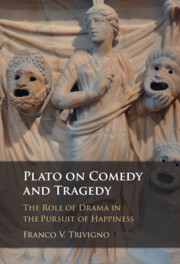Refine search
Actions for selected content:
93 results
Chapter 7 - Emerson’s “Experience” and Plato’s Republic
-
- Book:
- Emerson, the Philosopher of Oppositions
- Published online:
- 20 November 2025
- Print publication:
- 22 January 2026, pp 137-151
-
- Chapter
- Export citation
Chapter 13 - Independence and Kant’s Positive Conception of Freedom
- from Part V - Law and Morality in Kant’s Political Theory
-
-
- Book:
- Law and Morality in Kant
- Published online:
- 16 December 2025
- Print publication:
- 22 January 2026, pp 262-284
-
- Chapter
-
- You have access
- Open access
- HTML
- Export citation
Chapter 6 - The Revolution’s Political and Theatrical Stages
- from Part II - In Practice
-
- Book:
- Theatre and Censorship in France from Revolution to Restoration
- Published online:
- 30 November 2025
- Print publication:
- 18 December 2025, pp 190-214
-
- Chapter
- Export citation
Chapter 4 - Plato’s Definition of Tragedy
-
- Book:
- Plato on Comedy and Tragedy
- Published online:
- 24 October 2025
- Print publication:
- 13 November 2025, pp 125-163
-
- Chapter
- Export citation
Chapter 1 - Plato’s Definition of Comedy
-
- Book:
- Plato on Comedy and Tragedy
- Published online:
- 24 October 2025
- Print publication:
- 13 November 2025, pp 18-53
-
- Chapter
- Export citation

Plato on Comedy and Tragedy
- The Role of Drama in the Pursuit of Happiness
-
- Published online:
- 24 October 2025
- Print publication:
- 13 November 2025
Introduction
-
- Book:
- Zola's Dream
- Published online:
- 07 August 2025
- Print publication:
- 21 August 2025, pp 1-28
-
- Chapter
- Export citation
Chapter 5 - On Being Right
-
- Book:
- Zola's Dream
- Published online:
- 07 August 2025
- Print publication:
- 21 August 2025, pp 210-251
-
- Chapter
- Export citation
Chapter 1 - The Quarrel of the Idealists and the Naturalists
-
- Book:
- Zola's Dream
- Published online:
- 07 August 2025
- Print publication:
- 21 August 2025, pp 29-69
-
- Chapter
- Export citation
PRISON-BREAKING FROM PLATO’S CAVE
-
- Journal:
- The Classical Quarterly , First View
- Published online by Cambridge University Press:
- 06 August 2025, pp. 1-12
-
- Article
-
- You have access
- Open access
- HTML
- Export citation
Chapter 11 - The Natural Preconditions of Political Freedom
- from Part V - Reconciling between Freedom, External Authority, and Nature
-
-
- Book:
- Platonic Autonomy
- Published online:
- 07 August 2025
- Print publication:
- 31 July 2025, pp 235-255
-
- Chapter
- Export citation
Chapter 4 - Dialectic and Rational Agency
- from Part III - Internal and External Authorities
-
-
- Book:
- Platonic Autonomy
- Published online:
- 07 August 2025
- Print publication:
- 31 July 2025, pp 83-105
-
- Chapter
- Export citation
Chapter 1 - Accounts and Accountability
- from Part I - Self-Determination
-
-
- Book:
- Platonic Autonomy
- Published online:
- 07 August 2025
- Print publication:
- 31 July 2025, pp 19-42
-
- Chapter
- Export citation
Chapter One - A moral revolution? The law against adultery
-
- Book:
- The Politics of Immorality in Ancient Rome
- Published online:
- 28 February 2025
- Print publication:
- 06 March 2025, pp 34-62
-
- Chapter
- Export citation
6 - Greater Berlin
-
- Book:
- Berlin
- Published online:
- 13 February 2025
- Print publication:
- 30 January 2025, pp 109-133
-
- Chapter
- Export citation
Chapter 2 - The Spirit of Caesar and the Second Circle
-
- Book:
- Shakespeare's Political Spirit
- Published online:
- 12 December 2024
- Print publication:
- 19 December 2024, pp 77-111
-
- Chapter
- Export citation
Chapter 8 - Émeric Bergeaud’s Stella
-
-
- Book:
- A History of Haitian Literature
- Published online:
- 07 November 2024
- Print publication:
- 21 November 2024, pp 143-157
-
- Chapter
- Export citation
Chapter 3 - Early Learning in Plato, Republic 7
-
-
- Book:
- Conceptualising Concepts in Greek Philosophy
- Published online:
- 25 April 2024
- Print publication:
- 02 May 2024, pp 56-73
-
- Chapter
-
- You have access
- Open access
- HTML
- Export citation
Chapter 4 - Are Platonic Forms Concepts?
-
-
- Book:
- Conceptualising Concepts in Greek Philosophy
- Published online:
- 25 April 2024
- Print publication:
- 02 May 2024, pp 74-95
-
- Chapter
-
- You have access
- Open access
- HTML
- Export citation
Chapter 2 - The Sick Body Politic
-
- Book:
- The Body Politic in Roman Political Thought
- Published online:
- 01 February 2024
- Print publication:
- 08 February 2024, pp 61-94
-
- Chapter
-
- You have access
- Open access
- HTML
- Export citation
